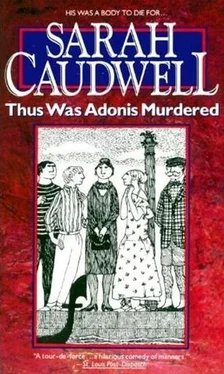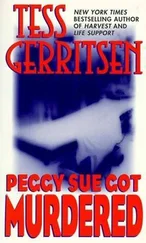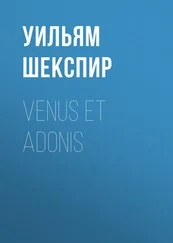“Quite sure, Professor Tamar,” said Marylou. “It was the way I told you — we were all together the whole time. If you’ve been hypothesizing that Kenneth might have done it — well, I’m sorry, but that’s just totally nonviable in terms of the time-space factor.”
We devoted ourselves with some despondency to our sherry — its excellence was no more than a marginal consolation.
“Reverting,” I said, “if it is not too painful for you, Marylou, to the discovery of the murder — there seem, from your description, to have been no signs of a struggle? Nothing to suggest that the unfortunate young man was stabbed in the course of a quarrel or anything of that nature?”
“No,” she said, “I guess not. It didn’t look like there’d been any kind of confrontation. It just looked like Ned had been lying face down, sleeping maybe, and if someone had come up quietly — well, Ned wouldn’t have known too much about it.”
“Have you any idea,” I asked, “why the Venetian police suspect Julia?”
“That’s what I don’t understand, Professor Tamar — I thought Julia was right out of it. You see, after we found Ned the way I told you, it was a pretty confused situation. I wanted Stanford to go get the Manager but Stanford was very resistant to leaving me. And I wasn’t about to leave Kenneth alone in the state he was in — he was in a really bad way, Professor Tamar. He was just kneeling by the bed with his arm round Ned’s shoulders and — well, I guess he was crying. Stanford said afterwards he didn’t think the British behaved that way. I pointed out to Stanford that that was simply a nonempirical prejudgment and had no validity whatsoever — but Stanford swallows nonempirical prejudgments the way athletes swallow vitamin pills. So in the final event it was the chambermaid who went to get the Manager.”
It was clear, at any rate, why suspicion had so soon attached itself to Julia: the chambermaid was one of those, no doubt, who had observed Julia going into the annexe with Ned and later leaving without him. Assisting shortly afterwards at the discovery of the corpse, it would have been natural for her simply to inform the Manager that the English gentleman in Room 6 had been murdered by the English lady in Room 8. “Was there,” I asked, “so far as you know, anyone else in the annexe?”
“Mrs. Frostfield and Major Linnaker — they were in the same group we were — they came out into the corridor to see what was going on. I guess the chambermaid had screamed some — I guess I had, too.”
“Did you happen to notice,” asked Ragwort, “whether they had changed for dinner?”
“Mrs. Frostfield certainly had — she was wearing a long skirt and evening slippers. It’s hard to say with Major Linnaker — he dressed pretty informally most of the time. Well, when the police came they searched all the rooms in the annexe but they didn’t find anyone. I don’t figure that means too much, though, because if someone wanted to get away it wouldn’t have been too hard to slip out of the window into the canal. Maybe it wouldn’t smell too good — but I guess it’s what I’d have done if I’d just committed a murder and wanted to get away.”
“And then?” I said.
“Well, the police made us all wait in the corridor. Except Kenneth — Kenneth wouldn’t leave Ned and they just let him stay. Then they got a stretcher and brought Ned out with a sheet over him and took him down the stairs. They’d got the police motor-launch right up next to the entrance, so they didn’t need to take him across the bridge. There’s only one light there and they stumbled a bit getting into the launch, but it was all right. And Kenneth just went right along with them and they didn’t stop him.”
I thought of the heavy-shouldered sculptor following the body of his friend; and easily imagined, for I too am familiar with the city, how little the single light and the fragments of its reflection in the black surface of the canal would serve to penetrate the Venetian darkness.
“Well,” said Marylou, “that was about it. They took statements from all of us through an interpreter, but it didn’t take long and it was all pretty informal. Then we had dinner in a private room — the Hotel Manager said we wouldn’t feel like eating in the dining-room after what had happened. It was very considerate of him — additionally to which, maybe he thought having a guest murdered on the premises wasn’t the best kind of publicity and he didn’t want us talking to anyone else about it. But Julia wasn’t there and I just figured she wasn’t involved any way at all because she hadn’t been in the annexe. That was kind of simplistic maybe, because she could have been in the annexe
and come down again. But I just assumed she’d got back late and gone straight to the dining-room.”
“That seems,” said Ragwort, “a very reasonable assumption.”
“So I didn’t see Julia again that evening and I wasn’t really feeling concerned about her. I mean, I was concerned because I knew she’d be upset, but not for any other reason. Well, next morning, when we were all meant to be at the landing stage to take the launch over to the airport, Julia wasn’t there. But even then I just figured she was having problems with her packing and maybe I’d better go and help her.” Prompted, if not caused, by the pitiful image of Julia attempting unaided to pack her suitcase, two large and evenly matched tears began to roll down in perfect parallel on either side of Marylou’s charming nose.
“My dear girl,” said Ragwort, “don’t cry.”
“Cheer up, old thing,” said Cantrip.
“Have some more sherry,” said Selena.
“I’m sorry,” said Marylou, “I guess it’s just a biochemical reflex. Well, that’s when Graziella told us Julia wasn’t coming, because the police still wanted to question her about the murder.”
Her first inclination, it seemed, on receipt of this intelligence, had been to remain in Venice until Julia could be extracted from the clutches of the police. Stanford, however, characteristically opposing this course of action, she had allowed herself, with a weakness which she now felt culpable, to be prevailed upon to return to London: she appeared to be seriously considering whether she ought not to make good this default by going straight back to Venice and persuading the Italian police of the absurdity of their accusations. We comforted her with assurances of the steps being taken to protect Julia’s interests; with promises to let her know of any further developments; and with two more glasses of Timothy’s sherry.
“It’s a bit much,” said Cantrip, when she had gone. “Losing three suspects all at one go.”
“I suppose,” said Ragwort, “that she could be lying.”
“No,” said Selena. “She must be telling us the same thing she told the Italian police. And that must be the same thing that Stanford and Kenneth Dunfermline told them. If it were merely a question of her evidence corroborating her husband’s, one might not take much notice. But conspiracy between all three — no, Ragwort, I really don’t think it’ll do.”
Timothy rang soon afterwards to tell us the bad news. We told him we knew. He told us it was worse.
It does me no credit — save in showing how little this chronicle is written in any spirit of self-advertisement — to admit that even now I was unable to identify the murderer and the motive for the crime. All the essential evidence was available: except to confirm an hypothesis already virtually assured no further investigation should have been necessary. Certain of my colleagues in the world of Scholarship would perhaps not scruple to omit all reference to their subsequent enquiries, preferring to set forth immediately the conclusions to be drawn from the evidence and to veil in silence their own delay in reaching them. The true scholar, however, should disdain such paltering.
Читать дальше











